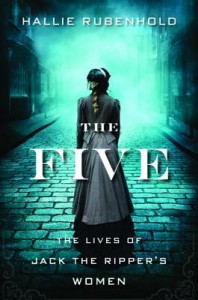Abandoned by Booklikes
Government drone by day and book lover and geek girl by night!
Currently reading








Polly, Annie, Elizabeth, Catherine and Mary-Jane

What a great book! I don't know what else to say except Rubenhold does such a great job of giving us a full picture of the five women who were murdered by Jack the Ripper. She goes in the order of the murders, with each section focusing on them from birth to death. She skips over their brutal murders and instead shows us how they lived, how they loved, and how many people were quick to blame these women and in some cases characterize them. Thank you Hallie Rubenhold for telling Polly, Annie, Elizabeth, Catherine, and Mary-Jane's stories.
"The Five" does something quite extraordinary, instead of splashing about in the sordid and terrible murders of the five women that Jack the Ripper killed in Whitechapel from April 1888 to November 1888 Rubenhold takes a hard look at the lives of the women in these cases. I can name several "Ripper" books out there where some historian or mystery writer tries to make a case why so and so was Jack the Ripper. The women are ignored except when the author wants to show photos of the deceased after being murdered or in mortuary photos. The women are treated as unimportant. Rubenhold rightly shines the light on the five women. In the case of Mary-Jane though, even though there's not a lot of historical data to go on, she does a great job of giving us a picture of her life and why no one really got a chance to know the real her.
Hallie does a great job in each section of telling the circumstances of the women's birth, information about the parents (if possible) and then how the women was raised. She also does an excellent job of portraying a dark and dirty London where women were treated as less than men. It took me about three days to finish this book because I didn't want to rush. Rubenhold obviously did a lot of research for this book and it shows. It also doesn't suffer from historian's disease with too much information thrown at you. She is able to make you feel you are right there as she tells you about these women, the men they married or loved, the children they bore, and their families. Also why some of them were unfairly maligned as prostitutes. I do have to say that I love Rubenhold's research into why so many statements were ignored or twisted by the police to paint some of these women as lesser women who no one should grieve.
"While the experience of homelessness in Victorian London was one of wretched misery for all who were forced to endure it, women like Polly, who found themselves without shelter, might also expect to become victims of sexual violence."
"However, before they had even listened to the full account, both the authorities and the press were certain of one thing: Polly Nichols was obviously out soliciting that night, because she, like every other woman, regardless of her age, who moved between the lodging houses, the casual wards, and the bed she made in a dingy corner of an alley, was a prostitute."
"Contrary to romanticized images of the Ripper’s victims, she never “walked the streets” in a low-cut bodice and rouged cheeks, casting provocative glances beneath the gas lamps. She never belonged to a brothel nor had a pimp. Neither is there any evidence that she was arrested or even cautioned for her behavior."
The flow works wonderfully from beginning to end.
The setting of the book for the most part focused on London in the Victorian age. However, Rubenhold in the case of Elisabeth Gustafsdotter focuses on Sweden during the same time period. Rubenhold shows how little power a woman truly had in both countries during this time period. Reading about the marriage laws, how a woman was forced into the workhouse if she was unmarried/widowed and had no ways of supporting herself. Rubenhold even goes into several Contagious Diseases Acts that were passed in countries where the focus was on shaming and in some cases mutilating women. Being unmarried and pregnant the woman was blamed even if she was "forced" by the master of the house or someone else.
"While a man could divorce his wife for a sexual liaison outside the marital bed, a woman had to prove her husband was guilty of adultery in addition to another crime, such as incest, rape, or cruelty. This Victorian double standard was enshrined in law, permitting a man to enjoy as many sexual dalliances as he wished, so long as he did not also rape the servants, have sex with his sister, and beat his wife too severely."
"Such relationships were regularly cited as being among the factors that drew women into lives of prostitution: “the housemaid of a pharmacist or a surgeon might be seduced by her master’s assistant; a lodging-house maid by a student, a commercial traveler or officer; . . . a hotel servant by a regular guest; a young clerk might seduce his parents’ servant-girl,” and so forth."
The ending of the book showing what each women was carrying on her when she was murdered will break your heart a bit. And I loved Rubenhold doing her best to show how these women lived and how the way they were murdered should not be what defines their legacy.






